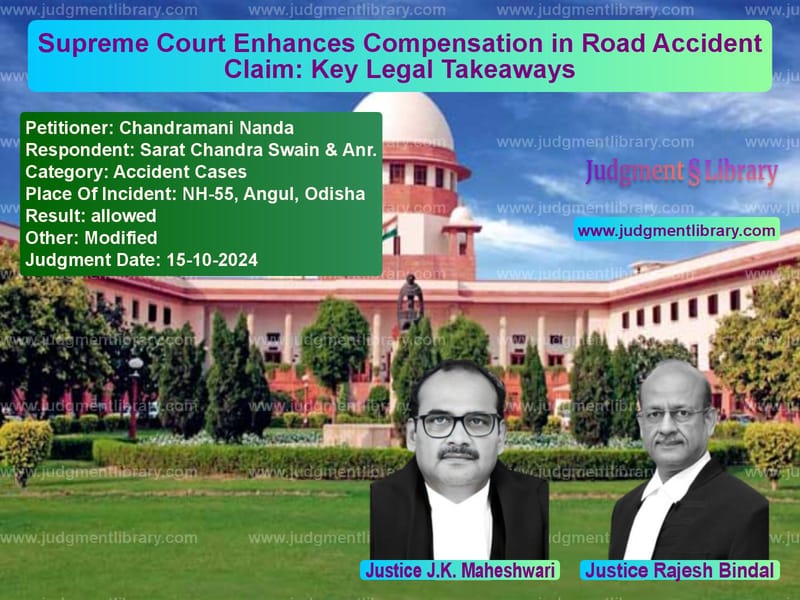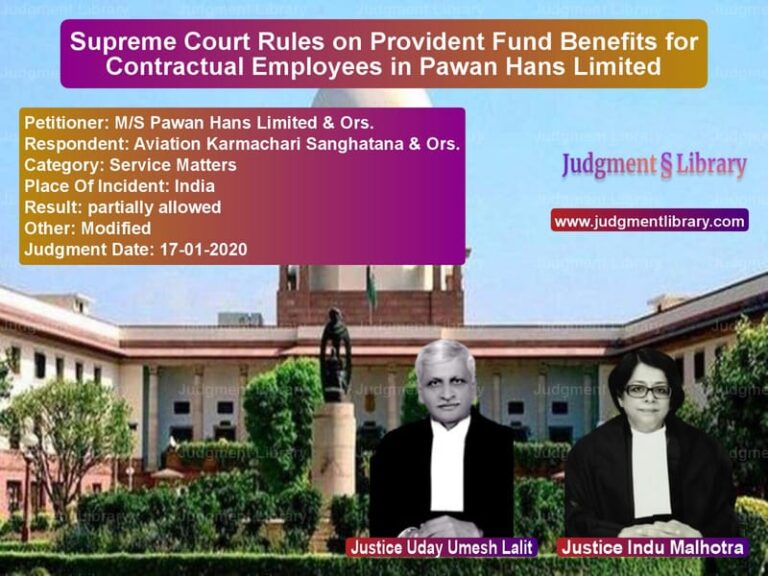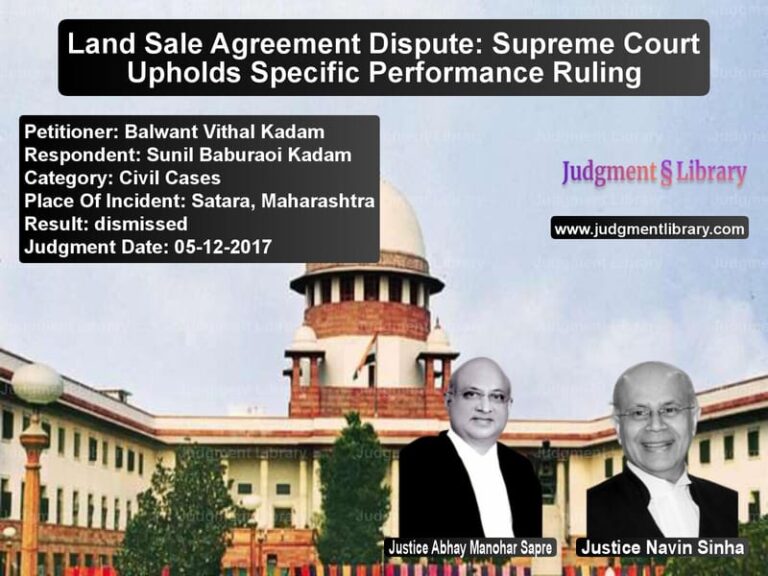Supreme Court Enhances Compensation in Road Accident Claim: Key Legal Takeaways
The Supreme Court of India, in Chandramani Nanda v. Sarat Chandra Swain & Anr., delivered a significant judgment on October 15, 2024, enhancing the compensation awarded to a victim of a road accident. The Court ruled that the claimant was entitled to a higher compensation due to the severity of his injuries, loss of earning capacity, and continued medical expenses.
Background of the Case
The case arose from a road accident that occurred on January 16, 2014, when a car carrying the appellant was hit by a speeding bus at NH-55 near CPP Chawk, NALCO, Angul, Odisha. The appellant suffered grievous head injuries and multiple fractures. He was initially treated at Angul Government Hospital before being transferred to Ashwini Hospital, Cuttack, where he underwent major brain surgery. His mother testified that due to the accident, he became mentally unsound and bedridden.
Chronology of Legal Proceedings
- 2014: A claim petition was filed seeking ₹30,00,000/- compensation.
- January 15, 2019: Motor Accident Claims Tribunal (MACT), Cuttack, awarded ₹20,60,385/- as compensation.
- 2022: The Orissa High Court enhanced the amount to ₹30,99,873/- based on 100% functional disability.
- October 15, 2024: Supreme Court further enhanced the compensation to ₹52,31,000/-.
Petitioner’s Arguments (Chandramani Nanda)
The petitioner, represented by legal counsel, argued:
- The High Court failed to consider future medical expenses adequately.
- The tribunal’s assessment of ₹1,62,420 per annum as income was outdated, as the appellant was earning ₹22,000 per month.
- The petitioner had suffered 100% functional disability due to his brain injury, warranting full loss of earning capacity.
- Compensation for pain and suffering was on the lower side and needed enhancement.
Respondent’s Arguments (National Insurance Company Ltd.)
The insurer countered:
- The High Court’s compensation of ₹30,99,873/- was already more than the amount originally claimed by the petitioner.
- The assessment of disability and earning capacity was exaggerated.
- The insurance company had already accepted the High Court’s ruling and did not prefer an appeal.
Supreme Court’s Analysis and Judgment
Enhanced Income Calculation
The Court noted that the tribunal had based its calculations on outdated income records. Referring to the petitioner’s salary certificate, the Court held:
“It would be reasonable to take the appellant’s income at ₹2,00,000 per annum, given his employment history and prior salary evidence.”
100% Functional Disability Recognized
The Court upheld the High Court’s finding that the appellant’s neurocognitive disability had led to total loss of earning capacity:
“Even if the medical disability is 60%, the functional disability due to cognitive impairments amounts to 100% loss of earning capacity.”
Additional Compensation for Future Prospects
Applying the principle from National Insurance Co. Ltd. v. Pranay Sethi, the Court added 40% future prospects to the income assessment:
“Given the appellant’s age of 32 years at the time of the accident, he is entitled to 40% enhancement for future prospects.”
Additional Compensation for Attendant and Marriage Prospects
Recognizing that the appellant would require lifelong assistance, the Court awarded:
- ₹1,00,000 for future attendant charges.
- ₹1,00,000 for loss of marriage prospects.
Final Compensation Breakdown
The Supreme Court revised the compensation as follows:
| Head | Compensation (₹) |
|---|---|
| Loss of future income (₹2,80,000 x 16 x 100%) | 44,80,000 |
| Medical expenses | 3,51,153 |
| Future attendant cost | 1,00,000 |
| Loss of marriage prospects | 1,00,000 |
| Pain and suffering | 1,00,000 |
| Future medical expenses | 1,00,000 |
| Total | 52,31,000 |
Key Takeaways from the Judgment
- Recognition of 100% Functional Disability: Even if medical disability is partial, functional disability can be full.
- Enhancement of Future Prospects: A claimant’s earning capacity must include potential future increments.
- Compensation for Non-Economic Losses: Loss of marriage prospects and need for an attendant are valid compensable damages.
Impact of the Judgment
- Strengthens Claims for Future Prospects: Provides a precedent for injured individuals seeking enhanced compensation.
- Recognizes Cognitive Disabilities: Reinforces that cognitive impairments affect earning capacity fully.
- Guides Future Road Accident Claims: Establishes benchmarks for compensation calculation.
Conclusion
The Supreme Court’s decision in Chandramani Nanda v. Sarat Chandra Swain & Anr. sets a new standard for accident compensation in India. By recognizing functional disability and future prospects, the judgment ensures that victims of severe injuries receive fair and just compensation. The case will likely influence similar claims in the future, particularly those involving cognitive impairments and loss of livelihood.
Petitioner Name: Chandramani Nanda.Respondent Name: Sarat Chandra Swain & Anr..Judgment By: Justice J.K. Maheshwari, Justice Rajesh Bindal.Place Of Incident: NH-55, Angul, Odisha.Judgment Date: 15-10-2024.
Don’t miss out on the full details! Download the complete judgment in PDF format below and gain valuable insights instantly!
Download Judgment: chandramani-nanda-vs-sarat-chandra-swain-supreme-court-of-india-judgment-dated-15-10-2024.pdf
Directly Download Judgment: Directly download this Judgment
See all petitions in Road Accident Cases
See all petitions in Compensation Disputes
See all petitions in Motor Vehicle Act
See all petitions in Negligence Claims
See all petitions in Damages and Compensation
See all petitions in Judgment by J.K. Maheshwari
See all petitions in Judgment by Rajesh Bindal
See all petitions in allowed
See all petitions in Modified
See all petitions in supreme court of India judgments October 2024
See all petitions in 2024 judgments
See all posts in Accident Cases Category
See all allowed petitions in Accident Cases Category
See all Dismissed petitions in Accident Cases Category
See all partially allowed petitions in Accident Cases Category







